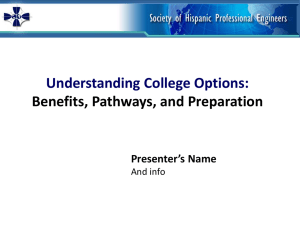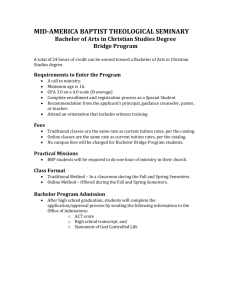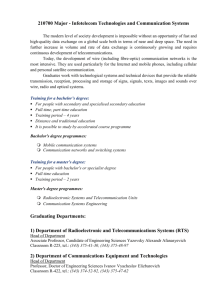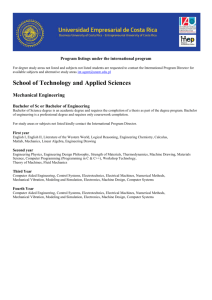BE: België/Belgique
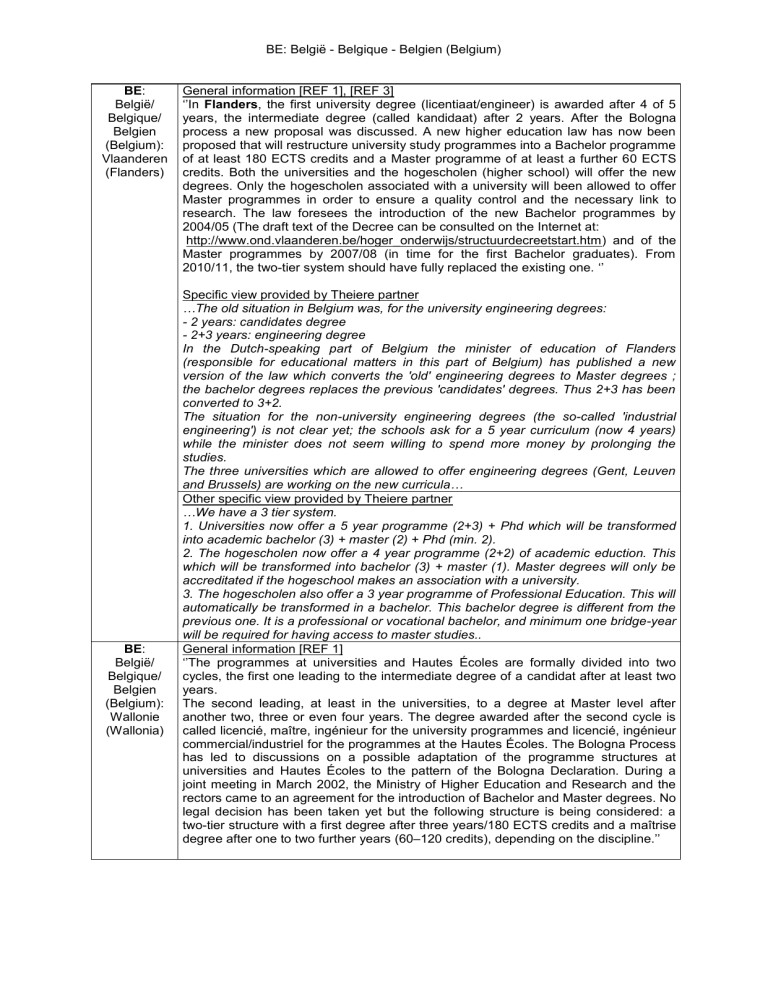
BE: België - Belgique - Belgien (Belgium)
BE :
België/
Belgique/
Belgien
(Belgium):
Vlaanderen
(Flanders)
BE
Belgien
(Belgium):
Wallonie
(Wallonia)
:
België/
Belgique/
General information [REF 1], [REF 3]
‘’In Flanders , the first university degree (licentiaat/engineer) is awarded after 4 of 5 years, the intermediate degree (called kandidaat) after 2 years. After the Bologna process a new proposal was discussed. A new higher education law has now been proposed that will restructure university study programmes into a Bachelor programme of at least 180 ECTS credits and a Master programme of at least a further 60 ECTS credits. Both the universities and the hogescholen (higher school) will offer the new degrees. Only the hogescholen associated with a university will been allowed to offer
Master programmes in order to ensure a quality control and the necessary link to research. The law foresees the introduction of the new Bachelor programmes by
2004/05 (The draft text of the Decree can be consulted on the Internet at:
http://www.ond.vlaanderen.be/hoger_onderwijs/structuurdecreetstart.htm) and of the
Master programmes by 2007/08 (in time for the first Bachelor graduates). From
2010/11, the two-tier system should have fully replaced the existing one. ‘’
Specific view provided by Theiere partner
…The old situation in Belgium was, for the university engineering degrees:
- 2 years: candidates degree
- 2+3 years: engineering degree
In the Dutch-speaking part of Belgium the minister of education of Flanders
(responsible for educational matters in this part of Belgium) has published a new version of the law which converts the 'old' engineering degrees to Master degrees ; the bachelor degrees replaces the previous 'candidates' degrees. Thus 2+3 has been converted to 3+2.
The situation for the non-university engineering degrees (the so-called 'industrial engineering') is not clear yet; the schools ask for a 5 year curriculum (now 4 years) while the minister does not seem willing to spend more money by prolonging the studies.
The three universities which are allowed to offer engineering degrees (Gent, Leuven and Brussels) are working on the new curricula…
Other specific view provided by Theiere partner
…We have a 3 tier system.
1. Universities now offer a 5 year programme (2+3) + Phd which will be transformed into academic bachelor (3) + master (2) + Phd (min. 2).
2. The hogescholen now offer a 4 year programme (2+2) of academic eduction. This which will be transformed into bachelor (3) + master (1). Master degrees will only be accreditated if the hogeschool makes an association with a university.
3. The hogescholen also offer a 3 year programme of Professional Education. This will automatically be transformed in a bachelor. This bachelor degree is different from the previous one. It is a professional or vocational bachelor, and minimum one bridge-year will be required for having access to master studies..
General information [REF 1]
‘’The programmes at universities and Hautes Écoles are formally divided into two cycles, the first one leading to the intermediate degree of a candidat after at least two years.
The second leading, at least in the universities, to a degree at Master level after another two, three or even four years. The degree awarded after the second cycle is called licencié, maître, ingénieur for the university programmes and licencié, ingénieur commercial/industriel for the programmes at the Hautes Écoles. The Bologna Process has led to discussions on a possible adaptation of the programme structures at universities and Hautes Écoles to the pattern of the Bologna Declaration. During a joint meeting in March 2002, the Ministry of Higher Education and Research and the rectors came to an agreement for the introduction of Bachelor and Master degrees. No legal decision has been taken yet but the following structure is being considered: a two-tier structure with a first degree after three years/180 ECTS credits and a maîtrise degree after one to two further years (60 –120 credits), depending on the discipline.’’
BE: België - Belgique - Belgien (Belgium)
1. BE: België - Belgique - Belgien (Belgium)
Coordinating author : Raf CATHOOR (EAEEIE, Karel de Grote Hogeschool, raf.catthoor@kdg.be)
Review: Hamed YAHOUI, (EAEE IE, Université Claude Bernard, Lyon 1, France)
1.1. General information
+1 + 2 + 3 + 4 + 5
18 19 20 21 22 23 24
Classical University
Candidate level
Classical University
Specialisation Doctorat
Burgerlijk ingenieur
/
Ingénieur civil
University of Prof.
Education Candidate level
University of Prof.
Education
Specialisation
( DESS
Specialisation)
Industrieel ingenieur /
Ingénieur industriel
One cycle type of professional
Education
Gegradue erde /
Graduat=
Bachelor
Figure 2.1: Belgian Higher Education System in EIE disciplines
25 26
Capital: Brussels. Population (thousands): 10,500
In 1993, Belgium became a federation of three communities, each with their own legislative council and government: the Flemish speaking, the French speaking and the German speaking community. The three communities have autonomy in education.
1.1.1 Electrical and Information Engineering in Belgium, boundaries of the field of study
The Belgian higher education has 2 types of universities:
1. The “Classical” Universities, (Universities of academic education) which offer a scientifically oriented education (duration 4 or 5 years, depending on the faculty).
2. The Universities of Professional Education, called “ Hogescholen ” (Flemish community) or
“ Haute Ecoles ” (French community). They offer a more job oriented higher education.
To obtain an academic level, the duration of the studies is 4 years: 2 cycles of 2 years. It is now called the “industrial engineering” programme.
All those universities offer several 3 year bachelor programmes as well. This is a one-cycle education, which is mainly aimed at vocational training. Only the institutions offering a twocycle education are considered to be at academic level.
BE: België - Belgique - Belgien (Belgium)
In the classical Universities, EIE is part of the faculty of Electrical – Electronics Engineering
(5 year study programme). Computer Technology and informatics is also taught in the faculty of Science (4 year study programme).
In the Universities of Professional Education, all EIE programmes are in one faculty. This means that Computer Technology or Technical Informatics is taught in the faculty of
Electrical – Electronics Engineering, together with the study fields Electronics,
Communication Net works, Multimedia, Chip design, … Only some universities of professional education have received the right to organise directly a field of study of Applied
Informatics. This is true for the 3 year one-cycle programme, as well as for the two-cycle industrial engineering programme.
In the 4 year industrial engineering programme, the traditional part of electrical engineering now belongs to the faculty of mechanical engineering: Electrical Drives and Machines, Power
Systems and Energy Economics, Electrical Measurements, Fundamentals and Theory of
Electrical Engineering, Automation and Control.
In the faculty of Electrical – Electronics Engineering, there are two specialisations in the third and fourth year: electronic design techniques, and ICT. In Flanders, in the first option there are 355 students, and in the second option 600 students (3 rd plus 4 th year).
In general, engineering studies are less popular than 10 years ago. Today, students are mainly interested in Informatics, Multimedia, web design, ... They have less interest in electricity and electronic design courses.
1.1.2 Content, degrees and accreditations
The content is defined by the law giving a list of obligatory courses. Each institution has the possibility to add a serial of specific courses to this list. EIE education profiles and the professional job profiles are defined in cooperation with representatives from the industry.
1.1.3 Implementation of the Bologna-BMD system in Belgium
There is a reshaping discussion of the EIE curricula going on both in Flanders and Wallonia.
The Classical Universities are tending towards a 3-5-8 (or more years) bachelor-master-PhD system.
The master title will be “master of science in engineering” (Dutch: master of science in de toegepaste wetenschappen ; French: master of science dans les sciences appliquées ).
The bachelor title will be “bachelor of science in engineering“ (Dutch: bachelor of science in de toegepaste wetenschappen ; French: bachelor of science dans les sciences appliquées ).
The faculties will keep the old na me “faculty of applied science” (Dutch: faculteit toegepaste wetenschappen ; French: faculté des sciences appliquées ).
The 4 year programme (2 cycles of 2 years) of the Universities of Professional Education will be transformed in a 3+1 bachelor-master system, or in a 3+2 bachelor-master system.
The master title will probably be “master in industrial sciences” (Dutch: master in de industriële wetenschappen ; French: master dans les sciences industrielles ).
The bachelor title will probably be “bachelor in industrial sciences“.
(Dutch: bachelor in de industriële wetenschappen ; French: bachelor dans les sciences industrielles ).
The master studies must apply for accreditation. An external, international body will give accreditation.
BE: België - Belgique - Belgien (Belgium)
In the Flemish community, all Universities of Professional Education will transform their four year programmes into a 3+1 bachelor-master system. One of the reasons is that there is not enough money to convert them to a five year programme. The new title will be “master in engineerin g”, the faculties will be called “faculty of industrial sciences” (Dutch: faculteit industriële wetenschappen ; French: faculté des sciences industrielles ).
These universities will have to associate with a classical university in order to obtain accreditation for their master studies. But the latter is only one of the conditions for obtaining an accreditation for their master programme. Most important is the requirement to work out scientific research activities, which must be significant and must be organised intra muros.
Some engineering schools are associating with a university without a faculty of engineering!
The Flemish minister of education would like to start with the new programmes in September
2004. This means that the first bachelor degrees will be given in 2008. The new education development plans of the institutes should be submitted by the end of September 2003.
In the French community, there is not yet an implementation of the Bologna-BMD system.
One of the ideas is to extend the studies of industrial engineering to 5 years; the industrial stage and the final work will be done during this 5 th year. This community believes that it will be hard to obtain accreditation for a one year master programme.
The 3 year programme of the Universities of Professional Education will automatically be transformed into a bachelor. This bachelor degree is different from the previous one, and a minimum of one bridge-year will be required for having access to master studies.
BE: België - Belgique - Belgien (Belgium)
1.2. Figures on the weight of EIE in Belgium
In the Universities of Professional Education, one cycle type, the number of EIE students is about 10 % of the total population.
In the Universities of Professional Education, two cycle type, the number of EIE students is about 8,5 % of the total population.
In the Universities, the number of EIE students is about 6 % of the total population.
(Data for Flanders, 2001-2002) http://www.ond.vlaanderen.be/hoger_onderwijs/online_statistiekennieuwSTART.htm
1.3. Degrees in EIE in Belgium
All students who hold an upper secondary education certificate have access to higher education.
Belgium has a three tier higher education system:
The Universities of Professional Education deliver a secondary school ("sec. sch.") +3 diploma for their one-cycle education, which is not of academic level. The secondary school
+3 diploma is a bachelor degree, e.g. bachelor in automatic control, bachelor in electronics, bachelor in telecommunications....
The Universities of Professional Education deliver a "sec. sch." +4 diploma for their twocycle education. This diploma is of academic level. The "sec. sch."+4 system ends with the diploma of “Industrial engineering”, e.g. industrial engineering in electronics.
Classical Universities with EIE curricula have in general a "sec. sch." +5 system. It ends with the “ Burgerlijk Engineer ” (Flemish community) or “ Ingénieur civil ” (French community) degree, which is equivalent to a Master degree, e.g. master in electronics, master in electricity, …
Only these universities organise an admission exam.
Computer Technology and Informatics is also a final degree in the faculty of Science, which is now a 4 year study programme.
1.3.1 Bachelor level (Gegraduerde/Graduat)
Bachelor in Electronics-ICT
Bachelor in Applied informatics.
Bachelor in Multimedia and Communication Technology
Bachelor in Informatics
1.3.2 Intermediate level, between bachelor and master ( Industrieel ingenieur/Ingénieur industriel
)
Industrial Engineering in Electronics specialisation Design Techniques
Industrial Engineering in Electronics specialisation Information and Communication Techniques
1.3.3 Master level (Burgerlijk ingenieur/Ingénieur civil)
Master in Electrotechnics, specialisation physical electronics
Master in Electrotechnics, specialisation ICT-micro-electronics
Master in Electrotechnics, specialisation ICT-multimedia and signal processing
Master in Electrotechnics, specialisation ICT-telecommunication and telematics
Master in Informatics
Master in Computer science (4 years)
BE: België - Belgique - Belgien (Belgium)
1.4. References
The information given in this monograph is based on the following documents and web links:
Education in the Flemish community: http://www.ond.vlaanderen.be/
Education in the French community: http://www.agers.cfwb.be/ http://www.restode.cfwb.be
Société Européenne pour la Formation des Ingénieurs (SEFI): http://www.sefi.be
BE: België - Belgique - Belgien (Belgium)
BE: België - Belgique - Belgien (Belgium)
Universities
City Name of the institution
Universities (Flemish community)
Antwerpen
Brussel
Brussel
Diepenbeek
Universiteit Antwerpen (UIA, RUCA, UFSIA)
Vrije universiteit Brussel (VUB)
Katholieke Universiteit Brussel (KUB)
Limburgs Universitair Centrum (LUC
Diepenbeek)
Gent Universiteit Gent (RUG)
Leuven Katholieke Universiteit Leuven (KULeuven)
Bruxelles
Liège
Louvain
Mons
Universities (French community)
Université libre de Bruxelles
Université de Liège
Université catholique de Louvain
Faculté polytechnique de Mons
Universities of professional education
City Name of the institution
Universities of professional education in EIE (Flemish community)
Antwerpen
Antwerpen
Hogeschool Antwerpen
Karel de Grote-Hogeschool-Katholieke
Hogeschool Antwerpen
Brugge-Oostende Katholieke Hogeschool Brugge-Oostende
Brugge-Oostende Hogeschool West-Vlaanderen
Brussel
Brussel
Hogeschool voor Wetenschap & Kunst
Erasmushogeschool Brussel
Gent
Gent
Kempen
Kortrijk
Katholieke Hogeschool Kempen
Katholieke Hogeschool Zuid-West-
Vlaanderen
Leuven Groep T Hogeschool Leuven
Limburg Hogeschool Limburg
Limburg Katholieke Hogeschool Limburg
Universities of professional education in EIE (French
Arlon
Bruxelles
Bruxelles
Bruxelles
Liège
Liège
Mons
Hogeschool Gent
Katholieke Hogeschool Sint-Lieven Gent community)
Haute Ecole de la Commu nauté française du Luxembourg Schuman
Haute Ecole de Bruxelles
Haute Ecole de la Communauté française
Paul-Henri Spaak
Haute Ecole Léonard de Vinci
Haute Ecole Charlemagne
Haute Ecole de la Province de Liège
Rennequin Sualem
Haute Ecole de la Communauté française du Hainaut
Mons Haute Ecole Roi Baudouin http address http://www.ua.ac.be/ http://www.vub.ac.be/ http://www.kubrussel.ac.be/ http://www.luc.ac.be/ http://www.rug.ac.be/ http://www.kuleuven.ac.be/ http://www.ulb.ac.be http://www.ulg.ac.be http://www.ucl.ac.be http://www.umh.ac.be http address http://www.ha.be www.kdg.be http://www.khbo.be http://www.hogeschool-wvl.be http://www.wenk.be http://www.ehb.be http://www.hogent.be http://www.kahosl.be http://www.khk.be http://www.katho.be http://www.groept.be http://www.hogelimb.be http://www.khlim.be http://www.hers.be http://www.heb.be http://www.isib.be/spaak http://www.vinci.be http://www.hecharlemagne.be http://www.prov-liege.be/hers http://www.hecfh.be http://www.herb.be
BE: België - Belgique - Belgien (Belgium)
2. BE: België - Belgique - Belgien (Belgium)
As written under 2.1.1 (1
st


